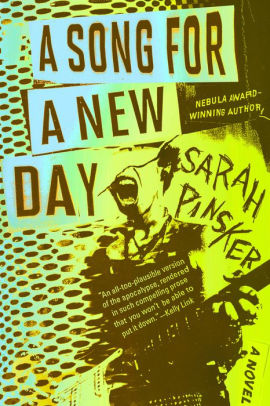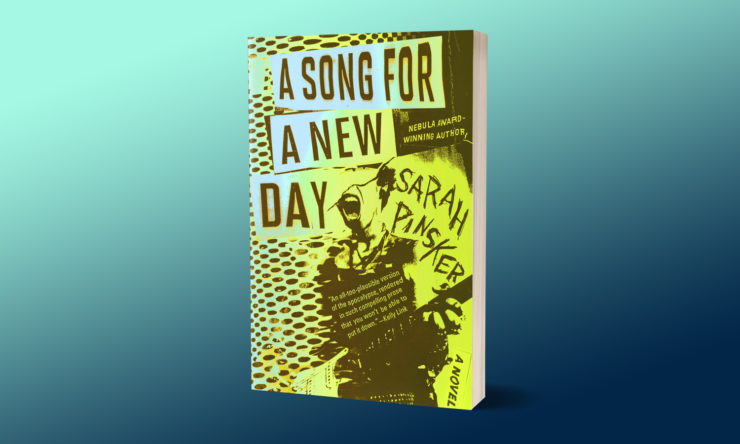Sarah Pinsker’s A Song For A New Day starts with an ending and a beginning. Luce is a touring musician in the near future; while on the road, Luce and her band start to notice things happening around them that suggest their society is on the verge of something big. A bomb threat prompts their hotel to be evacuated. Soon, they band learns that this isn’t an isolated incident, that something larger is happening. By the end of it, an element of American society will have been pushed past its breaking point, with large gatherings of people—concerts, sporting events—made illegal. Luce will find herself with the dubious distinction of being the last major musician to perform live before society changed forever.
That’s the ending. The beginning? That happens with Rosemary, who works for a ubiquitous retailer called Superwally and lives on a small isolated farm with her parents. A chance encounter at her job leads to a job offer from StageHolo Live—essentially, a virtual concert-going experience that has an effective monopoly on live music. Rosemary’s story begins a few years after Luce’s—though the two will eventually sync up—and one of the quietly unnerving facets of Pinsker’s novel is how Rosemary takes for granted things that Luce (or nearly anyone reading the novel) will find alienating.
Rosemary came of age at a time where virtual interactions were the norm, where interacting within large groups of people was simply not done. “We didn’t think about it,” Rosemary’s mother tells her when her job takes her to Baltimore. “We went to movie theaters where hundreds of people sat in the same room and stadiums where thousands sat next to each other.” By the time of the bulk of A Song For a New Day’s narrative, that era has passed; as Rosemary experiences the world, there are tiny reminders that any sort of congregation is frowned upon, both by custom and by law.
Extrapolating the future of security theater and applying it to things most people take for granted is one of several ways Pinsker’s novel feels deeply lived-in. So too are the musical dynamics: by the time Rosemary encounters her, Luce is running an underground venue and playing music in a number of groups, each with a different sound. There’s an adventurousness there, one which lines up with a number of iconic contemporary musicians. (Any one of several members of The Mekons or Sonic Youth would serve as a solid touchstone.) Pinsker is herself a musician, and her descriptions of local scenes and onstage dynamics rings deeply true, whether she’s writing about a rock band or an electronic musician making use of biomechanical implants.
Rosemary’s work finding new artists for StageHolo Live leads to her path crossing with Luce’s. Here, too, there’s tension—the perennial conflict between the music industry and the DIY advocate familiar to, well, anyone with a passing knowledge of punk rock. But even when local music scenes have been raided by local law enforcement, the actual act of holding a concert wasn’t itself illegal. By setting this novel in a society where DIY can literally be against the law, Pinsker ups the suspense considerably. To call this novel completely dystopian wouldn’t be entirely accurate, though: there’s a passing reference to states having established a basic income, for instance. It’s a fascinating paradox: elements of this world are utterly terrifying, but Pinsker balances that neatly with elements to show its appeal.
Buy the Book


A Song for a New Day
If you read Pinsker’s collection Sooner or Later Everything Falls Into the Sea—and you should, because it’s fantastic—you’ve encountered a version of this story in the form of the novelette “Our Lady of the Open Road.” In keeping with one of A Song For a New Day’s themes—in this case, the need for constant evolution—it’s worth mentioning that the two are relatively distinct entities, covering some of the same ground but hitting the same notes within a different structure. Much as Luce runs certain songs through different permutations, even different genres, so too is Pinsker taking this story to different places. A novel-length version of “Our Lady of the Open Road” would have been a compelling enough read on its own; it’s to Pinsker’s credit that she opted for a more difficult path.
There’s something very zeitgeist-y about what Pinsker does here. It would make for an interesting triple (literary) bill with Rob Hart’s The Warehouse (with which it shares a concern about what an all-powerful retailer might do) and Jeff Jackson’s Destroy All Monsters (which which it shares a concern about the paranoia that can come from a crowded public space). But for all that Pinsker’s novel feels very relevant in 2019, she’s also grappling with some classically science fictional themes. Rosemary’s status quo, where long-distance encounters are the norm and physical contact is alien, also brought to mind the distant society in Isaac Asimov’s The Naked Sun.
There aren’t many books that can accurately convey the dynamics of a local DIY music scene and tap into a decades-long tradition of speculative fiction. Sarah Pinsker’s A Song for a New Day makes it seem effortless—but in focusing on the taxing nature of the creative process under duress, she also reminds the reader of how difficult “effortless” can be. Relevant, haunting, and inspiring, this is one of the best books of 2019.
A Song for a New Day is available from Berkley Press.
 Tobias Carroll is the managing editor of Vol.1 Brooklyn. He is the author of the short story collection Transitory (Civil Coping Mechanisms) and the novel Reel (Rare Bird Books).
Tobias Carroll is the managing editor of Vol.1 Brooklyn. He is the author of the short story collection Transitory (Civil Coping Mechanisms) and the novel Reel (Rare Bird Books).










